Ballads and Folksongs from West Virginia
by Ruth Ann Musick
The Journal of American Folklore, Vol. 70, No. 277 (Jul. - Sep., 1957), pp. 247-261
[This excellent collection of Ballads and Folksongs from West Virgina by Musick was presented in two editions of The Journal of American Folklore- I've combined it into one long article. I've also moved the music to the lyric section instead of at the end as originally presented.
It's likely the reference in No. 9 and 15.2 is to the "Hammons" collection not the "Ammons" collection. R. Matteson 2011]
BALLADS AND FOLKSONGS FROM WEST VIRGINIA
BY RUTH ANN MUSICK
[Part 1] 1. Songs 1-7
[Part 2] 2. Songs 8-26
1. SONGS 1.-7.
ALTHOUGH I have wandered through the West Virginia hills with a tape recorder, my chief sources of material have been students in my folk literature classes and the response to a weekly newspaper column on folklore which I conducted for six years. The collection thus established includes many songs dealing with the Civil War, local events, the temperance movement, and religion, as well as the variants of Child ballads and other songs of English origin from which the following selection has been made.[1]
1. "Six Kings' Daughters" (Lady Isabel and the Elf-Knight, Child 4) [2]
1.1. Contributed by Mrs. Emma Glasscock of Colfax, who grew up in Wetzel County and there learned the ballad from her half-sister (see Ex. 1 of music)
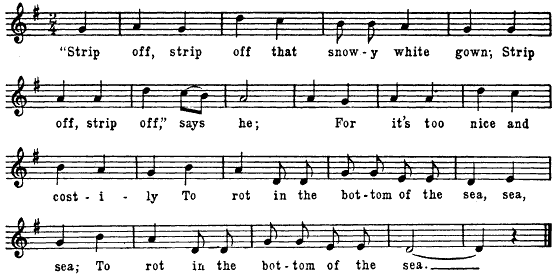
(1) "Strip off, strip off that snowy white gown;
Strip off, strip off," says he;
"For it's too nice and cost-i-ly
To rot in the bottom of the sea, sea, sea;
To rot in the bottom of the sea."
(2) He turned his back to the leaves of the tree;
He turned his back on to me;
I gave him a push and I pushed him in.
"Lie there in the bottom of the sea, sea, sea;
Lie there in the bottom of the sea."
1.2. Contributed by Mrs. Bertha Tichenor of Fairmont, who learned it from her mother; her niece reported the text, with some variations but no tune, to John Harrington Cox (see n. 2), who used it as his version F. Only the tune (Ex. 2) and the first ten verses known to Mrs. Tichenor are given.
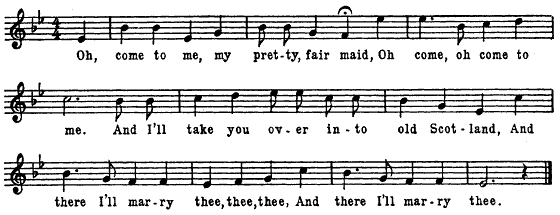
(1) "Oh, come to me, my pretty, fair maid,
Oh, come, oh, come to me.
And I'll take you over into old Scotland,
And there I'll marry thee, thee, thee,
And there I'll marry thee."
(2) "Oh, you must steal your father's gold,
Likewise your mother's fee,
And two of the best horses in your
father's stable,
Wherein stand thirty-three, three, three,
Wherein stand thirty-three."
(3) "Oh, I have stoled my father's gold,
Likewise my mother's fee,
And two of the best horses in my father's stable,
Wherein stood thirty-three, three, three,
Wherein stood thirty-three."
(4) She mounted on the milk-white steed,
And him upon the bay;
And they rode till they came to the salt, salt sea,
Four long hours before it was day, day, day,
Four long hours before it was day.
(5) "Light off, light off, my pretty fair maid,
Light off, light off," said he,
"For six king's daughters have I drownded here,
And you the seventh shall be, be, be,
And you the seventh shall be."
(6) "Sir, turn yourself three times around,
And look to yonder's tree."
And she gathered him up in her lilywhite arms,
And cast him into the sea, sea, sea,
And cast him into the sea.
(7) "Lie there, lie there, you false-hearted knight,
Lie there instead of me,
For you promised to take me into old Scotland,
And there you'd marry me, me, me,
And there you'd marry me."
(8) She mounted on the milk-white steed,
And home she led the bay;
She rode till she came to her own father's castle,
Three long hours before it was day, day, day,
Three long hours before it was day.
(9) Then the king cried out from his silken couch,
In the bower where he lay,
Saying, "What has disturbed my
pretty parrot
So long before it is day, day, day,
So long before it is day?"
(10) "Hush up, hush up, my pretty parrot,
And tell no tales on me,
And your cage shall be made of yellow, beaten gold,
And hung on yon willow tree, tree, tree,
And hung on yon willow tree."
1.3. Contributed by Walter H. Keener of Burton, who called it "He Mounted on His Milk-White Nag" (Ex. 3), and had almost exactly the same tune for Sir Hugh, or, The Jew's Daughter (Child 155).
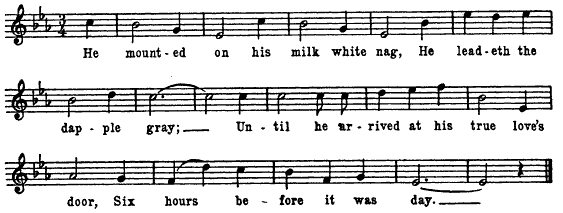
(1) He mounted on his milk-white nag,
He leadeth the dapple gray;
Until he arrived at his true love's door,
Six hours before it was day.
(2) He rode upon his milk-white nag,
She rode the dapple gray;
Until they arrived at the dark seaside,
Six hours before it was day.
(3) Then he mounted off the milk-white nag,
"Dismount, I pray," said he,
"For six pretty maids have I drownded here
And the seventh one you shall be."
(4) She mounted off the dapple gray.
"Your rings and robe," said he;
"Please take them off, my pretty maid,
And deliver them unto me."
(5) "Oh, lover, lover, this I pray,
Please turn your back on me."
She grabbed him 'round the slender waist
And dashed him right into the sea.
(6) "True love, true love, I cannot swim;
Your hand please give to me!"
"Six fair ones you have drownded here,
But the seventh one you shall be!"
(7) She mounted on his milk-white nag,
She leadeth the dapple gray;
Until she arrived at her father's door,
Six hours before it was day.
1.4. Contributed by Mrs. Myrtle Carter of Talcott, who does not remember the title.
(1) She mounted upon the pony brown,
And he on the dapple gray;
They rode till they came to the side of the sea,
On the end of a long summer day, day, day,
On the end of a long summer day.
(2) "Get off, get off, my pretty fair maid,
I'll hitch your beast to the tree.
Take off, take off that lovely gown
And hand it over to me,
For I know it is too finer a gown
To rot in the salt-water sea, sea, sea,
To rot in the salt-water sea."
(3) "Please turn yourself around and stand,
With your face toward the sea,
For I know you are too finer a man
For a naked woman to see, see, see,
For a naked woman to see."
(4) He turned his back-then she gave him a push,
And he plunged into the sea.
"Lie there, lie there, you false-hearted man,
Lie there instead of me.
You would have stripped me naked as I was born,
But I'll take nothing from thee."
(5) She mounted upon her pony brown,
And led the dapple gray,
And rode till she came to her father's house,
On the end of a long summer day, day, day,
On the end of a long summer day.
(6) "Hush up! Hush up, my pretty polly!
Don't tell any tales on me;
I'll buy you a cage of the very finest gold
And hang it in the green willow tree, tree, tree,
And hang it in the green willow tree."
----------------------------------------------
2. "The Two Sisters" (The Twa Sisters, Child 10) [3]
2.1. Text and tune contributed by Mrs. Amanda Ellen Eddy of Rivesville, who learned them from her mother; melody (Ex. 4) from a recording made by Mrs. Eddy's niece, Edith McCord (former student).
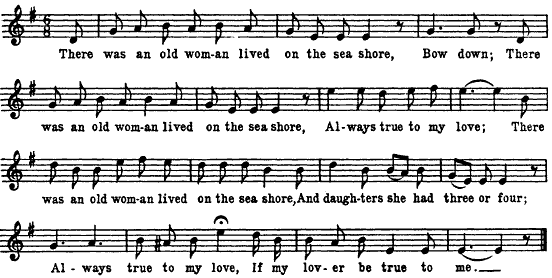
(1) There was an old woman lived on the sea shore,
Bow down;
There was an old woman lived on the sea shore,
Always true to my love;
There was an old woman lived on the sea shore,
And daughters she had three or four;
Always true to my love, if my lover be true to me.
(2) The youngest one she caught a beau,
Bow down;
The youngest one she caught a beau,
Always true to my love;
The youngest one she caught a beau;
The oldest didn't like that, you know;
Always true to my love, if my lover be true to me.
(3) It's, oh, dear sister, let's walk the sea shore,
Bow down;
It's, oh, dear sister, let's walk the sea shore,
Always true to my love;
It's, oh, dear sister, let's walk the sea shore,
And see the ships as they sail o'er;
Always true to my love, if my lover be true to me.
(4) And as they walked along the sea brim,
Bow down;
And as they walked along the sea brim,
Always true to my love;
And as they walked along the sea brim,
The oldest pushed the youngest in;
Always true to my love, if my lover be true to me.
(5) She bowed her head and away she swam,
Bow down;
She bowed her head and away she swam,
Always true to my love;
She bowed her head and away she swam,
She swam till she came to the miller's dam;
Always true to my love, if my lover be true to me.
(6) It's, oh, dear miller, I've gold rings ten,
Bow down;
It's, oh, dear miller, I've gold rings ten,
Always true to my love;
It's, oh, dear miller, I've gold rings ten,
And if you'll pull me from your dam;
Always true to my love, if my lover be true to me.
(7) The miller he threw in his own grab hook,
Bow down;
The miller he threw in his own grab hook,
Always true to my love;
And brought her safely from his brook;
hook,
And brought her safely from his brook;
Always true to my love, if my lover be true to me.
(8) And when he got her gold rings ten,
Bow down;
And when he got her gold rings ten,
Always true to my love;
And when he got her gold rings ten,
He pushed her in his dam again;
Always true to my love, if my lover be true to me.
(9) The miller was hung on his own mill gate,
Bow down;
The miller was hung on his own mill gate,
Always true to my love;
The miller was hung on his own mill gate,
For the drowning of my sister Kate;
Always true to my love, if my lover be true to me.
3. "Johnnie Randall" (Lord Randall, Child 12) [4]
3.1. Contributed by Mrs. Louise McNeill Pease, who learned it in Pocahontas County (see Ex. 5); only the first verse is included here.
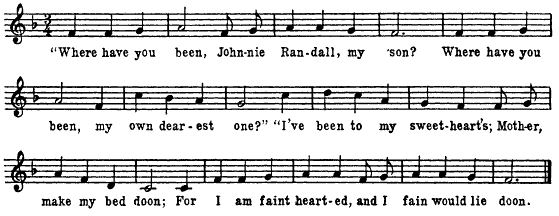
(1) "Where have you been, Johnnie Randall, my son?
Where have you been, my own dearest one?"
"I've been to my sweetheart's; Mother, make my bed doon;
For I am faint hearted, and I fain would lie doon."
3.2. Contributed by Mrs. Madeline Hawkins of Fairview, who learned it from her mother in Enterprise.
(1) "Where have you been, Johnny Randall, my son?
Where have you been, my own dearest one?"
"I've been to pretty Polly's, Mother, make by bed soon;
I've a pain in my head, and I fain would lie down."
(2) "Where did you get your supper, Johnny Randall, my son?
Where did you get your supper, my own dearest one?"
"I got it at pretty Polly's, Mother, make my bed soon;
I've a pain in my head, and I fain would lie down."
(3) "What did you have to eat, Johnny Randall, my son?
What did you have to eat, my own dearest one?"
"Bread, butter and cake, Mother, make my bed soon;
I've a pain in my head, and I fain would lie down."
(4) "What did you have to drink, Johnny Randall, my son?
What did you have to drink, my own dearest one?"
"Cold coffee and poison, Mother, make my bed soon;
I've a pain in my head, and I fain would lie down."
(5) "What do you will to your mother, Johnny Randall, my son?
What do you will to your mother, my own dearest one?"
"I will her sweet heaven, Mother, make my bed soon;
I've a pain in my head, and I fain would lie down."
(6) "What do you will to your sweetheart, Johnny Randall, my son?
What do you will to your sweetheart, my own dearest one?"
"I will her hell's fire, and it will scorch her heart brown;
I've a pain in my head, and I fain would lie down."
4. "The Two Brothers" (The Twa Brothers, Child 49) [5]
4.1. Contributed by Mrs. Glasscock, who learned it from her mother in Wetzel County (see Ex. 6).

(1) Two pretty little brothers went out to play;
Two pretty little brothers were they, they, they;
Two pretty little brothers were they.
(2) One said to the other, "It's, oh, dear brother,
Why don't you throw a light stone at me, me, me,
Why don't you throw a light stone at me?"
(3) "It's, oh, dear brother, I am too young
To throw a light stone at you, you, you,
To throw a light stone at you."
(4) He took his knife all out of his pocket
And gave him his deathly wounds, wounds, wounds,
And gave him his deathly wounds.
5) He tore his shirt right off of his back
To tie up his deathly wounds, wounds, wounds,
To tie up his deathly wounds.
(6) "Now, if my playmates call for me,
Just tell them I'm dead and gone, gone, gone,
Just tell them I'm dead and gone."
(7) "And if my parents call for me,
Just tell them I've gone to sleep, sleep, sleep,
Just tell them I've gone to sleep."
(8) "And all the tears that's shed o'er me,
Just wipe them on a cold, white sheet, sheet, sheet,
Just wipe them on a cold, white sheet."
---------------------------------------------------
5. "Lord Batesman" (Young Beichan, Child 5)
5.1. Contributed by Mrs. Glasscock (see Ex. 7)
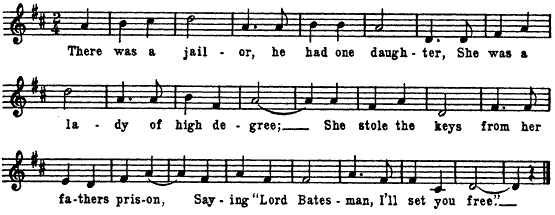
(1) There was a jailor, he had one daughter,
She was a lady of high degree;
She stole the keys from her father's prison,
Saying, "Lord Batesman, I'll set you free."
(2) "It's you have gold and you have silver,
And you have houses of high degree;
It's which of these will you give to this lady,
If she from bondage will set you free?"
(3) "Yes, I have gold and I have silver,
And I have houses of high degree;
It's all of these will I give to this lady,
If she from bondage will set me free."
(4) "Oh, well," says she, "we'll make a bargain,
For seven long years it's for to stand;
It's you're to marry no other woman,
And I will wed no other man."
(5) After seven long years had passed and gone,
And seven long years came to an end;
She gathered up her richest cothing,
Saying, "I'll go and I'll seek my friend."
(6) She inquired for Lord Batesman's palace
On every corner of the street;
She inquired for Lord Batesman's palace
From all of whom she had chance to meet.
(7) And when she came to Lord Batesman's palace,
She rang so loud upon the ring;
There was none so ready as the brisk young porter
To go and let this fair lady in.
(8) "Oh, Sir, is this Lord Batesman's palace?
And is the Lord himself within?"
"Oh yes, this is Lord Batesman's palace;
Him and his bride have just came in."
(9) She wrang her hands, she tore her hair, saying,
"Alas, alas, I am undone;
I wish I was back to my native country,
Across the sea, there to remain."
(10) "Go tell him to send me one ounce of bread
And a bottle of his wine so strong;
And ask him if he's forgot the lady
That set him free from the iron chain."
(11) The porter ran unto his master,
And bowing low upon his knee;
"Arise, arise, my brisk young porter,
And tell us what the trouble be."
(12) "Oh, Sir, there's a lady at your gate,
And she doth weep most bitterly;
I think she is the fairest creature
That ever my eyes had chance to see."
(13) "She has more rings upon her fingers,
Around her waist is a diamond chain;
She has more gold upon her clothing
Than your new bride and all her kin."
(14) "She wants you to send her one ounce of bread
And a bottle of your wine so strong;
And asks you if you've forgot the lady
That set you free from the iron chain."
(15) He stomped his foot upon the floor;
He broke the table in pieces three,
Saying, "Adieu, adieu to my wedded bride;
A second wedding there shall be."
(16) Then up bespake the first bride's mother,
And she was a lady of high degree;
"Oh, Sir, you've married my only daughter!"
"Well, she is none the worse of me."
(17) "Your daughter came on horse and saddle;
She shall go back in a coach and three;
For since my fair one has arrived,
A second wedding there shall be."
(18) He took her by her lily-white hand;
He led her o'er the marble floors;
He changed her name from Susannah Fair,
And now she's the wife of Lord Batesman.
(19) He took her by the lily-white hand;
He led her through from room to room;
He changed her name from Susannah Fair,
And now she's the wife of Lord Batesman.
5.2. Contributed by Mrs. T. B. Henderson of Flemington (see Ex. 8) [7]
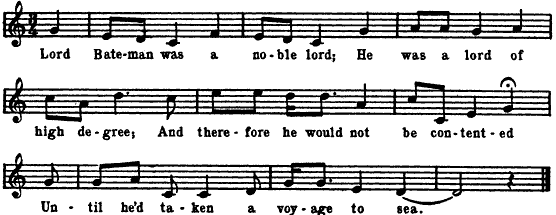
(1) Lord Bateman was a noble lord;
He was a lord of high degree;
And therefore he would not be contented
Until he'd taken a voyage to sea.
(2) He sailed east, he sailed west,
He sailed unto a Turkish shore,
Where he was caught and bound in prison,
Never to see daylight no more.
(3) The king, he had an only daughter,
And a pretty young girl was she;
She stole the keys to her father's prison,
She swore Lord Bateman she would see.
(4) "Have you got houses, have you got land,
And are you lord in your country?
And what would you give to a Turkish lady,
Who'd set you at your liberty?"
(5) "Yes, I have houses and I have land,
And I am lord in my country,
And I'd give it all to anybody
Who'd set me at my liberty."
(6) She gave him a slice of her best bread,
A bottle of their Turkish wine,
And every toast she drank unto him,
"I wish Lord Bateman was my own."
(7) She took him down to the sea harbor,
She bargained with a ship of fame,
Saying, "Fare you well, my young Lord Bateman,
I never shall see you again."
(8) Lord Bateman made a solemn vow,
And that for seven long years to stand,
Saying, "I will marry no other woman,
If you will marry no other man."
(9) "For seven long years I'll wait for thee,
Full seven long years and one year more,
And if I don't hear nothing from you,
Then I will leave the briny shore."
(10) Full seven long years was done and over,
Full seven long years had come and passed,
She gathered up her gay good clothing
And vowed the ocean she would cross.
(11) She went up to Lord Bateman's castle,
She knocked most loudly at the ring.
"Who's there, who's there?" cried the brave young porter,
"Who would knock so loud would fain come in."
(12) "Say, is this here Lord Bateman's castle?
And is his Lordship now within?"
"Oh, yes, oh, yes," cried the young proud porter,
He, this morning, brought his young wife in."
(13) She wrang her hands, she tore her hair,
She cried aloud, "I am undone!
I wish, I wish, but all in vain,
I wish I was back in Turkey again."
(14) "I want a slice of his best bread,
A bottle of his Spanish wine,
I want to know if he yet remembers
Who freed him from his iron band."
(15) He went into Lord Bateman's castle,
And fell upon his bended knee.
"Arise, arise," said young Lord Bateman,
"Arise, arise, and tell to me."
(16) "There is a lady in your castle,
And she does weep most bitterly;
For seven long years I've been in this country,
As fair a lady never to see."
(17) "And she has rings on every finger,
And on her middle finger three;
She has enough of gold about her
To buy your bride and her company."
(18) "She wants a slice of your best bread,
A bottle of your Spanish wine,
She wants to know if you yet remember
Who freed you from your iron band."
(19) Lord Bateman rose up from the table,
He made the golden dishes fly,
Saying, "Take my gold, and take my silver,
That is my handsome Susan Coy."
(20) Up speaks, up speaks the young bride's mother,
In a voice most loud and high,
Saying, "Will you forsake my youngest daughter,
And marry now that Susan Coy?"
(21) "It's true I married your youngest daughter,
But she's not none the worse of me,
For she came here on a horse and saddle,
And can go home in coaches three."
(22) He took her by the lily-white hand,
He led her o'er the marble stone,
He changed her name from Susan Coy
To the bride of Lord Bateman.
6. "The Brown Girl" (Lord Thomas and Fair Annet, Child 73) [8]
6.1. Contributed by Mrs. Thomas G. Welch and son, Lynn, of Albright (see Ex. 9).
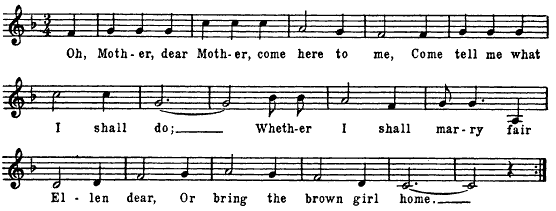
(1) "Oh, Mother, dear Mother, come here to me,
Come tell me what I shall do;
Whether I shall marry fair Ellen dear,
Or bring the brown girl home."
(2) "The brown girl, she has house and land;
Fair Ellen, she has none;
Therefore I think you had better, my son,
Go bring the brown girl home."
(3) "Go saddle, go bridle my milk-white steed,
Go saddle and bridle for me;
For I'm going to invite fair Ellen dear
To my wedding dinner to-day."
(4) He rode up to fair Ellen's gate;
He rattled at the ring;
And there was none so ready as she
To arise and let him in.
(5) "Good news, good news, good news," she cried;
"Bad news, bad news," cried he;
"For I've come to invite you to my wedding dinner,
And that's bad news today."
(6) She then rode up to Lord Thomas's gate;
She rattled at the ring;
And there was none so ready as he
To arise and let her in.
(7) He took her by the lily-white hand,
He led her across the hall;
Where there sits four and twenty young ladies
And she is the fairest of all.
(8) Says she, "Lord Thomas, which is your bride?
I think she is wonderful brown;
You once might have had as fair a young lady
As ever the sun shone on."
(9) The brown girl having a knife in hand,
The blade both keen and sharp,
She slipped it under fair Ellen dear's arm,
And pierced her through the heart.
(10) "What makes you look so wonderful pale?
What makes you look so pale?
You used to carry your rosy, red cheeks,
But now your color has failed."
(11) "Oh, can't you see, oh, plainly see,
Oh, can't you plainly see,
My heart's cold blood come twinkling down,
Come twinkling to my knee?"
(12) He took the brown girl by the hand,
He led her across the hall,
Drew back his sword, cut off her head,
And slung it against the wall.
(13) He put the evy against the wall
And pierced him through the heart;
It never was known in all this world
Three lovers so soon to part.
(I4) "Oh, Mother, dear Mother, go dig my grave,
Go dig it both wide and deep,
And place fair Ellen dear by my side,
And the brown girl at my feet."
6.2. Sung by Mr. Keener, who learned it from his father and can give no other background for it, this is but a fragment of Child 73, or possibly Child 81, Little Musgrave and Lady Barnard (see Ex. 10).

He cut his wife's head off
And he kicked it up against the wall.
6.3 From the W. A. Ammons collection, Fairview [9]
(1) "It's shall I go to Lord Thomas's wedding,
Or shall I stay at home?
It's by my life I'll go to his wedding
And see his young wife home, home,
And see his young wife home."
(2) She dressed herself in silk and satin,
Most glorious to behold;
And every town that she rode through,
They took her to be some queen, queen,
They took her to be some queen.
(3) She rode till she came to Lord Thomas's gate,
She rapped, she knocked, she rung;
And who was there to let her in,
Lord Thomas was himself, self,
Lord Thomas was himself.
(4) He took her by the ladylike hand,
He led her through the hall;
And he set her down on the finest chair,
Amongst the ladies all, all,
Amongst the ladies all.
(5) "Is this your wife, Lord Thomas?" she said,
"I think she is mighty brown;
You might have had as fair a wife
As ever the sun shone on, on,
As ever the sun shone on."
(6) Lord Thomas's wife, with a knife in her hand,
The blade both keen and sharp;
Just between the long rib and the short,
She pierced fair Ellender's heart, heart,
She pierced fair Ellender's heart.
(7) Lord Thomas, with a razor in hand,
The blade so cruel sharp,
He cut his own wife's head off
And threw it against the wall, wall,
And threw it against the wall.
(8) Lord Thomas, with a sword in his hand,
The blade so long and slim,
The handle of the sword he put on the floor,
The blade he run through his own heart, heart,
The blade he run through his own heart.
6.4. Text (some twenty-three stanzas in all, of which only the first is included) contributed by Mrs. Eddy; sung by her sister, Mrs. Edna Wright of Farmington (see Ex. 11).
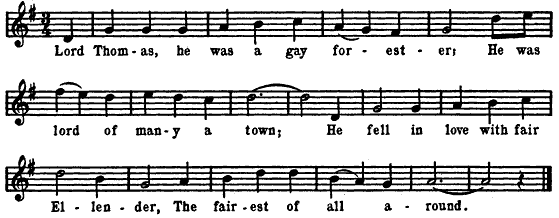
Lord Thomas, he was a gay forester;
He was lord of many a town;
He fell in love with fair Ellender,
The fairest of all around.
7. "Lady Margaret" (Fair Margaret and Sweet William, Child 74) [10]
7.1. Contributed by Mrs. Glasscock, who learned it from a cousin; only her first two and final two verses are given (for music see Ex. 12).
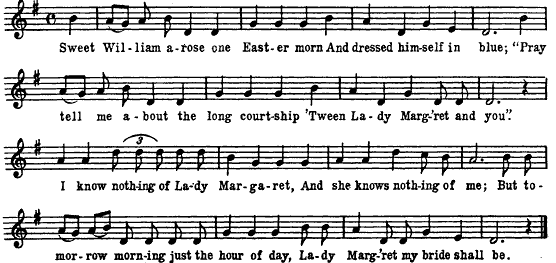
(1) Sweet William arose one Easter morn
And dressed himself in blue;
"Pray tell me about the long courtship
'Tween Lady Marg'ret and you."
(2) "I know nothing of Lady Margaret,
And she knows nothing of me;
But tomorrow morning just the hour of day,
Lady Marg'ret my bride shall be."
(13) "Is Lady Margaret in her drawingroom?
Or is she in the hall?
Or is she in her high chamber,
A-combing her long yellow hair?"
(14) "She is not in her drawingroom;
She is not in the hall;
But she lies in yonder in her cold coffin,
With her pale face turned to the wall."
7.2. Contributed by Mrs. Ethel Cunningham of Smithfield, as sung by Frank Fisher of Wetzel County.
(I) One May morning Sweet William arose
And dressed himself in green;
Lady Margaret'sm other appeared unto him and said
"What's between Lady Margaret and you?"
(2) He said, "I know nothing of Lady Margaret;
Nothing's between Lady Margaret and me;
But tomorrow morning at the earliest, six o'clock,
Lady Margaret I must see."
(3) Lady Margaret, a-sitting in her hall door,
Combing back her hair,
When she spied her Sweet William
and his only intended
Bride in yonder's churchyard.
(4) As they drew near, she threw away her ivory comb,
And out her door she fell;
She never, never woke, nor she never, never spoke,
Nor she never rose any more.
(5) Sweet William, he was wedded, and he was bedded,
Bedded in the finest of sheets;
And Lady Margaret's ghost appeared unto him,
Standing at his bed feet.
(6) Saying, "How do you like your bed?" says she;
How do you like your sheets?
And how do you like your newly wedded wife,
That in your arms do sleep?"
(7) "Well do I like my bed," says he;
"Well do I like my sheets (says he);
But far better do I like that pretty little miss
A standin' at my bed feet."
(8) "I dreamed a dream the other night;
I fear it is no good;
I dreamed my room was full of ill,
And I seen my bed swimming in blood."
(9) "I called in my servant men,
It's one, it's two, it's three.
I must take leave from my newly wedded wife,
For Lady Margaret I must see."
(10) "Is she in her own bedroom?
Or is she in her hall?
Or is she in her kitchen,
With modesty of all?"
(11) "Is neither in her own bedroom,
Or is she in her hall;
But yonder she lies in her own coffin,
With her face turned to the wall."
(12) "Unfold those lily-white sheets,
For I must see her again;
For oft times I've kissed her red, rosy cheeks,
And she has oft kissed mine."
(13) The first he kissed was her red, rosy cheeks,
And the next he kissed her chin;
And the next he kissed was her claycold lips,
That pierced his heart within.
(14) Lady Margaret died as though today;
Sweet William died tomorrow;
Lady Margaret died in pure heart's love,
Sweet William died of sorrow.
(15) Out of her grave there grew a red rose,
Out of his a brier;
And they grew to the church steeple top,
And couldn't grow any higher.
And there they entwined in a true love knot,
For all true lovers to admire.
---------------------------------------------
NOTES Part I. Songs 1-7
1. [This is a revised and expanded version of an article which was accepted for the JAF prior to I953. Publication has been delayed, for technical reasons, on responsibility of the present editor. The collection is now presented in two sections, the second of which will appear in October. Musical examples have been grouped together following the texts and numbered consecutively through both sections, as have also the notes. Ed.] In addition to contributors named above, the author wishes to thank for their assistance Joseph E. Waddell, Everett Smith, and Dr. and Mrs. O. Rex Ford.
2. See also H. M. Belden, Ballads and Songs Collected by the Missouri Folk-Lore Society, Univ. of Mo. Studies, XV:i (Columbia, Mo., I940), 5-16; Paul G. Brewster, Ballads and Songs of Indiana, Ind. Univ. Pub., Folklore Series, No. i (Bloomington, I940), 31-36; Louis W. Chappell, Folk-Songs of Roanoke and the Albemarle (Morgantown, I939), p. 12: John Harrington Cox, Folk Songs of the South (Cambridge, Mass., I925), pp. 3-I7; MacEdward Leach, The Ballad Book (New York, 1955), pp. 53-59; W. Roy Mackenzie, Ballads and Sea Songs from Nova Scotia (Cambridge, Mass., I928), pp. 3-8; Alton C. Morris, Folksongs of Florida (Gainesville, 1950), pp. 237-241; Vance Randolph, Ozark Folksongs (Columbia, Mo., 1946-50), I, 41-47; Dorothy Scarborough, A Song Catcher in Southern Mountains (New York, I937), pp. 126-128; Cecil Sharp, English Folksongs from the Southern Appalachians, ed. Maud Karpeles (London, 1932) I,, 1-13.
3. See Belden, pp. 16-24; Brewster, pp. 42-50; Chappell, p. I3; Cox, pp. 20-22; Leach, pp. 74-78; Morris, pp. 243-247; Randolph, I, 50-63; Scarborough, pp. I64-I65; Sharp, I, 26-35; Evelyn Hendrick Wells, The Ballad Tree (New York, 1950), pp. I49-I50.
4. See Belden, pp. 24-28; Brewster, pp. 5I-52; Chappell, p. 14; Cox, pp. 23-28; Leach, pp. 8I-85; Josephine McGill, Folk-Songs of the Kentucky Mountains (New York, I917), pp. 18-22; Morris, pp. 247-248; Musick, unpub. Missouri coll., "Arnold, My Son"; Randolph, I, 63-67; Scarborough, pp. I78-I80; Sharp, I, pp. 38-44; Wells, pp. 101-102.
5. See Belden, pp. 33-34; Brewster, pp. 55-57; Chappell, p. I7; Cox, pp. 33-36; Leach, pp. 164- 167; McGill, pp. 54-58; Morris, pp. 254-255; Randolph, I, 76-80; Scarborough, pp. 166-167; Sharp, I, 65-76.
6. See Chappell, pp. I8-20; Cox, pp. 38-4I; Leach, pp. I69-174; Mackenzie, pp. I6-19; Morris, pp. 259-262; Randolph, I, 80-88; Scarborough, pp. 210-213; Sharp, I, 77-88.
7. Among other songs which Mrs. Henderson sang (first at the West Virginia Folklore Society meeting in the summer of 1953 and later for my tape recordings), "The Murder of McKinley" is particularly interesting because the refrain, though evidently intended as a kind of prayer, is sung to the tune of "How Dry I Am." Some of her variations in text are both interesting and
puzzling, e.g., in "Six Kings' Daughters" she uses the phrase, "She gathered him up in her white metal arms"; in "The Two Sisters," the refrain "Most gentily" seems somewhat misleading when combined with the last stanza; and in her "Lord Thomas" there occurs the line "She rode till she came to his stock market," which at first I misunderstood to be "salt market," though the
former was subsequently established as correct so far as she is concerned. Mrs. Henderson has very few fragments. She has an excellent memory, and most of her songs tell the complete story.
8. This appears in almost every collection, including Percy's Reliques; see also Belden, pp. 37- 48; Brewster, pp. 58-70; Chappell, pp. 23-24; Cox, pp. 45-64; Leach, pp. 239-245; Mackenzie, pp. 200-204; McGill, pp. 26-33; Morris, pp. 265-272; Musick, unpub. Mo. coll.; Randolph, I, 93-I07; Scarborough, pp. 105-II6; Sharp, I, pp. 115-13; Wells, pp. 106-107. The curious word "evy" (stanza 13) probably means handle or hilt.
9. I lack tunes for all texts contained in the Ammons manuscript, which is one of the best "copybook" collections I have ever seen, and would be happy to correspond on the subject with other collectors. His notebook covers I22 pages and 66 different songs, of which four are Child ballads, one is a composite, many are of English origin, some are native American or West Virginian, and a number are religious in nature. There are no fragments; all texts are complete.
10 In Percy's Reliques and many American collections, e.g., Belden, pp. 48-5I; Brewster, pp. 71-78; Chappell, pp. 25-26; Cox, pp. 65-77; Leach, pp. 247-250; Mackenzie, pp. 25-26; McGill, pp. 69-77; Randolph, I, 108-II2; Scarborough, pp. I03-105; Sharp, I, pp. 132-145.
Fairmont State College
Fairmont, West Virginia
---------------------------------------
Ballads and Folksongs from West Virginia (Part 2) 2. Songs 8-26-----------------------------
2. SONGS 8-26
8. "Little Massy Groves" (Little Musgrave and Lady Barnard, Child 81) [12]
8.1. Sung by John Rittenhouse, of Mannington (see Ex. 13 of music).
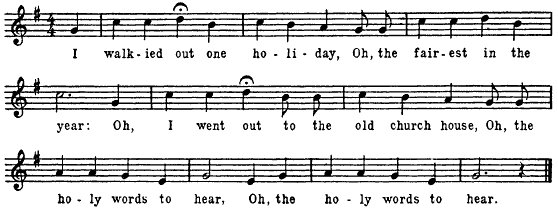
(1) I walk-ied out one holiday,
Oh, the fairest in the year;
Oh, I went out to the old church house,
Oh, the holy words to hear,
Oh, the holy words to hear.
(2) The first of the ladies were dressed in red,
Oh, the next came down in green;
Oh, the next came down Lord Arnold's wife,
As fair as any queen,
Oh, as fair as any queen.
(3) "Come and go home with me, Little Massy,
Come and go home with me tonight."
"I know by the rings upon your hand,
Oh, you're Lord Arnold's wife,
Oh, you're Lord Arnold's wife."
(4) Her little foot page was standing there,
Oh, a-hearin' what they'd say;
He made a vow Lord Arnold should know
Before the break of day,
Oh, before the break of day.
(5) He had but sixteen miles to go,
And ten of them he run;
He run till he came to the brokendown bridge,
Oh, he bowed his head and he swum,
Oh, he bowed his head and he swum.
(6) He swum till he reached the other side;
Lord Arnold he did see;
"Bad news, bad news, I bring to you,
Bad news I bring to thee;
Oh, Little Massy Groves gone home with your wife,
Your wife I take it to be,
Oh, your wife I take it to be."
(7) "If this be the truth that you bring to me,
Rewarded you shall be,
But if this be a lie that you bring to me,
On the gallows you will hang,
On the gallows you will hang."
(8) "If this be a lie that I bring to you,
As you believe it to be,
You need not build a gallows for me,
Just hang me on a tree,
Oh, just hang me on a tree."
(9) Lord Arnold drew his men in a row,
Bid them not to speak or to say a word,
Or nary a horn to blow,
Or nary a horn to blow.
(10) Someone respected Little Massy Groves,
For they blew both loud and shrill,
For they blew both loud and shrill.
(11) "I must git up and go," he said,
"I must git up and go;
Lord Arnold is a living man,
I hear his horn a-blow,
Oh, I hear his horn a-blow."
(12) "Lie still, lie still, must you," she said,
"And keep me from the cold;
It's nothing but my father's shepherd boy
A-leadin' their sheep to the fold,
Oh, a-leadin' their sheep to the fold."
(I3) He took his lady on his knee
And he said unto her,
"Which do you like the best?" he said,
"Oh, me or Massy Groves?
Oh, me or Massy Groves?"
(14) "Very well do I like your cheek," she said;
"Very well do I like your chin;
But better do I like Little Massy Groves
Than you and all your kin,
Oh, than you and all your kin."
(15) He took his lady by the hair of the head,
And he drug her over the plain;
He drew his sword, and one mighty blow,
He split her head in twain,
Oh, he split her head in twain.
(16) Sweetly sings the nightingale,
Oh, sweetly sings the sparrow;
Lord Arnold slew his wife today,
And he will die tomorrow,
And he will die tomorrow.
[Mr. Rittenhouse: "And the story goes on, Lord Arnold woke him up early in the morning, and the Lord had a fine knife and things to fight with, and Massy Groves didn't have any. So they had an awful good fight, and Lord Arnold, he was the victor, and after Lord Arnold gained the victory he took his wife on his knee...."]
8.2. From the Ammons notebook (see n. 9), where its title is given as "Young Arnold's Wife." I have been unable to record the tune.
(1) The first came up was scarlet red,
The second a violet blue,
The third came up was Lord Arnold's wife,
The fairest of the crew.
(2) She cast her eye on young McGrew,
The like had never been known;
"McGrew, McGrew, would you be so kind,
To ride along home with me?"
(3) "Oh that, oh that, I dare not do;
I dare not for my life;
For I tell by the ring on little finger,
You are Lord Arnold's wife."
(4) "What if I am Lord Arnold's wife?
Lord Arnold is not at home;
He's gone unto young Henry's house,
To bring young Henry home."
(5) The little foot page was standing by,
He heard every word they said;
He thought he would go to young
Henry's home,
Before he went to bed.
(6) He ran till he came to the water so deep;
He leaped in, he swam;
He swam till he came to the other shore,
He leaped out, he ran.
(7) He ran till he came to Lord Arnold's gate,
He knocked, he rapped, he rung;
And who was there to let him in
But Lord Arnold was himself.
(8) "What news, what news, do you bring from town?
What news do you bring for me?
Is any of my buildings burning up,
Or any of my walls fell down?"
(9) "There's none of your buildings burning up,
Or any of your walls fell down;
Your wife's in bed with another man
In fair London town."
(10) "If this be a lie you tell to me,
Which I suppose it to be,
I'll build a scaffold so high, so high,
And you shall hanged be."
(11) "If this be a lie I tell to you,
Which you suppose it to be,
You need no gallows so high to build,
But hang on yonder tree."
(12) The chickens is crowing, "It's day, it's day!"
The chickens is crowing, "It's day!"
When a man's in bed with another man's wife,
It's time he was up and away.
(13) Early next morning McGrew he woke;
Lord Arnold was standing at his feet.
"How do you like my bed?" said he,
"And how do you like my sheet?"
(14) "Very well do I like my bed," said he;
"Very well do I like my sheet;
Far better do I like your little ladie,
That's in my arms asleep."
(15) "Get up, get up, your clothes put on,
Get up, your clothes put on;
For it never shall be said of me,
I murdered a naked man."
(16) "Oh that, oh that, I dare not do,
I dare not for my life;
For you have swords by your side,
And I haven't got a knife."
(17) "If I've got swords at my side,
They cost me deep in my purse;
And you can have the very best one,
And I will take the worst."
(18) "And you can strike the very first blow,
And strike it like a man;
And I'll strike the very next blow,
I'll kill you if I can."
(19) McGrew he struck the very first blow,
He wounded Lord Arnold sore;
Lord Arnold struck the second blow,
McGrew, he could strike no more.
(20) He took his wife by her white hand,
He gave her kisses three;
He held his sword in his right hand,
He pierced her deep and severe.
(21) Lord Arnold killed them, as today,
And he is to be hung tomorrow;
This man and woman, they lived in peace,
But shortly died in sorrow.
9. "Barbara Allen" (Bonny Barbara Allen, Child 84) [13]
9.I. This contribution, by Mr. Keener, who learned it from "old Mrs. Lemley" of Wetzel County, has the tune that is most widely known-but the text is unusual. Perhaps someone read into the term "Scarlet Town" a wicked meaning and decided the tavern
was a bawdy house. Verses are missing between (2) and (6). (See Ex. 14.)
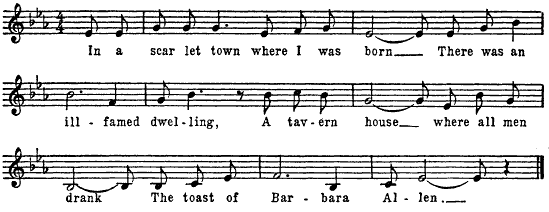
(1) In a scarlet town where I was born,
There was an ill-famed dwelling;
A tavern house where all men drank
The toast of Barbara Allen.
(2) No fairer maid has ever lived,
Nor bore so much of sorrow,
For wagging tongues and idle hearts
Her love from her did borrow.
(6) Said, "Barbara, I am dying."
But from his bed she turned her head,
For he was surely lying.
(7) They told her how he drank a toast
To evil Eva Baylor;
And not a toast he drank to her,
Her lover, he had failed her.
(8) When he was dead and in his grave,
Her heart was filled with sorrow;
"Oh, Mother, Mother, take my head,
I die for him tomorrow."
(9) "Those evil tongues have lied to me,
And I believed a liar;
Upon my grave will grow a briar,
And on his grave a flower."
9.2. This version, from Mrs. Glasscock (who learned it as a child from her grandmother) does not have a particularly unusual tune either; according to Bayard, it is the "Bayne Water" air (see Ex. 15). The first verse alone is given.

(1) All in the merry month of May
When the green buds were swelling,
Sweet William on his deathbed lay
For the love of Barbara Allen.
10. "Lamkin" (Lamkin, Child 93) [14]
10.1. Mrs. Eric Barnitz of Fairmont learned this comparativelyr are ballad as a child in Pennsylvania from her mother, Mrs. A. C. Miller, who later recorded it for me. Bayard states the tune to be unusual for this ballad (see Ex. 16).

(1) "Oh, wife, dear wife
Beware of your life;
Beware of young Lamkins
He will be here [needles, fire] tonight.
(2) "Oh, wife, dear wife,
What a pity it is
To stick this little infant
Full of needles and pins."
(3) While young Lamkins was a-hanging
On the gallows so high,
The false nurse was burning
In a fire close by.
11. "Gypsy Davy" (The Gypsy Laddie, Child 200) [15]
11.1 Contributed by Mr. Rittenhouse. This version is the only one I know in which the lady goes back to her husband; in all others she stays with the gypsy. (See Ex. 17.)
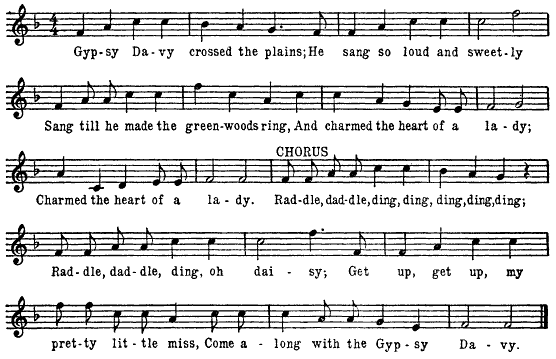
(1) Gypsy Davy crossed the plains
He sang so loud and sweetly
Sang till he made the greenwoods ring,
And charmed the heart of a lady;
Charmed the heart of a lady.
(2) "Harness up the milk-white steed,
For the brown is not so steady,
Ride and I'll ride and I'll ride all night
Till I overtake my lady,
Overtake my lady.
Chorus: Raddle, daddle, ding, ding, ding, ding, ding;
Raddle, daddle, ding, oh daisy;
Get up, get up, my pretty little miss,
Come along with the Gypsy Davy.
(3) He rode, he rode, he rode all night,
He rode where the crick was shady;
There he found his own true-love
In the arms of Gypsy Davy,
The arms of Gypsy Davy.
[Rittenhouse here interpolates", Now he was wanting to take her back, you know, and she said":]
(4) "Last night I slept in the mud and the rain
In the arms of Gypsy Davy,
But tonight I'll sleep in a feather bed,
With my arms around my baby,
My arms around my baby."
12. "Geordie" (Geordie, Child 209) [16]
12.1. Roger W. Pease of Morgantownl earned this as a boy in Massachusetts from his mother and aunt (see Ex. 18).

(1) Oh, saddle me my milk-white steed;
Oh, saddle me my pony;
For tonight I ride to London Town
To fight for the life of Geordie.
(2) Oh, Geordie stole nor cow nor calf;
His crimes were never many;
But he stole sixteen of the king's white steeds
And he sold them in Bohemy.
13. "The House Carpenter" (James Harris [The Daemon Lover], Child 243) [17]
13.1. Contributed by George R. Jefferson of Benton's Ferry, who learned the melody and words from his uncle, Alex Toothman of Farmington. Bayard says of this tune that it is "quite unusual for 'The House Carpenter,'" and that it is interesting in its own right, "since it is a remarkable example of a 'link' between two very distinct and different versions of a common British air. One of these versions, in the South, generally goes to the forms of 'Lady Isabel and the Elf Knight,' and the other is known everywhere to 'Lord Lovel'." As the text is more or less identical with the ones usually collected, only the first twelve
verses are given here (see Ex. 19.)
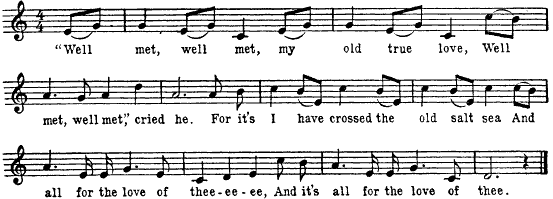
(1) "Well met, well met, my old true love,
Well met, well met," cried he.
"For it's I have crossed the old salt sea
And all for the love of thee- ee- ee
And it's all for the love of thee."
(2) "Oh, I could have married a king's daughter dear,
And fain would she had me;
But I have deserted both silver and gold,
And it's all for the love of thee- ee- ee,
And it's all for the love of thee."
(3) "If you could have married a king's daughter dear,
I am sure I'm not to blame,
For I have married a house carpenter,
And I'm sure he's a fine young man man- man,
And I'm sure he's a fine young man."
(4) "If you'll desert your house carpenter
And go along with me,
I will take you to where the grass grows green
On the banks of the sweet Willie-ee -ee,
On the banks of the sweet Willie."
(5) "If I desert my house carpenter
And go along with thee,
What have you got to maintain me on
And keep me from slavery-ee--ee,
And keep me from slavery?"
(6) "If you'll desert your house carpenter,
And go along with me,
I've five hundred and ten brave, bold seamen,
And they all shall wait on thee-ee-ee,
And they all shall wait on thee!"
(7) She pick-ed up her wee little babe
And she gave it kisses three,
Saying, "You must stay with your papa dear,
And keep him company-ee-ee,
And keep him company."
(8) They had not been at sea two weeks,
I'm sure it was not three,
Until this fair maiden began to weep,
And she wept most bitterly- ee- ee,
And she wept most bitterly.
(9) "Oh, is it for my gold that you weep,
Or is it for my store?
Or is it for that house carpenter
That you'll never see any more- more- more,
That you'll never see any more?"
(10) "It is not for your gold that I weep,
Nor is it for your store,
But it is for that sweet, little babe
That I'll never see any more- more- more,
That I'll never see any more!"
(11) They had not been at sea three weeks,
I am sure it was not four,
Till the old salt ship, she sprang a leak,
And she sank to rise no more- more- more,
And she sank to rise no more.
(12) Well, cur'sed be a sailor's lot,
Well, cur'sed be his wife,
For he has deprived me of my house carpenter,
And deprived me of my life- life -life,
And deprived me of my life.
13.2. Contributed by Mrs. Hawkins, who learned it from her mother, and was not sure what "Omat" meant but thought it might be the girl's name. As the ballad usually begins, "Well met, well met, my own true love," the derivation of "Omat" would seem
reasonable. Randolph's version K, p. 172 of his Ozark Folksongs (see n. 2) gives a similar beginning from Lillian Short, who explained that the girl's name was Matt, perhaps short for Mattie.
(1) "Omat, Omat," said the sailor boy,
"Omat, Omat," said he;
"I've just returned from the salt, salt
And it's all for the sake of thee.
(2) "If you will leave your house carpenter,
And go along with me,
I will take you where the grass grows green,
On the banks of the sweet Belvedree."
(3) "If I leave my house carpenter,
And go along with you,
What will become of my sweet little sea, babe,
That I leave on the other shore?"
(4) "Oh, is it for my gold you weep,
Or is it for my store?
Or is it for the house carpenter,
That you left on the other shore?"
(5) "Oh no, it's not for your gold I weep,
Nor neither for your store;
It's all for the sake of the sweet little babe
That I left on the other shore."
14. "The Mermaid" (The Mermaid, Child 289) [18]
Contributed by Mrs. Glasscock, who learned it from her grandmother. This ballad seems to be not too widespread; most collectors have only one text or fragment. The verses have the same tune as the chorus (see Ex. 20.)
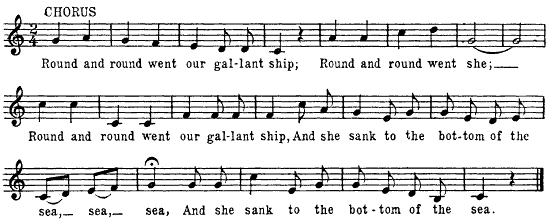
(1) Up stepped a man of our gallant ship,
A well-spoken man was he,
Saying, "I have a wife in fair New York town,
And this night she'll be waiting for me, me, me,
And this night she'll be waiting for me."
(2) Up stepped a girl of our gallant ship,
A well-spoken girl was she,
Saying, "I have a sweetheart in fair New York town,
And this night broken-hearted he will be, be, be,
And this night broken-hearted he will be."
(3) The stormy winds did blow,
The raging seas did roar,
While us poor seamen go flying to the top,
And the landlubber lies down below, below, below,
And the landlubber lies down below.
15. "Pretty Sally" (The Brown Girl, Child 295) [19]
15.1. Contributed by Mrs. Glasscock, who learned this not too common ballad from her grandmother (see Ex. 21).
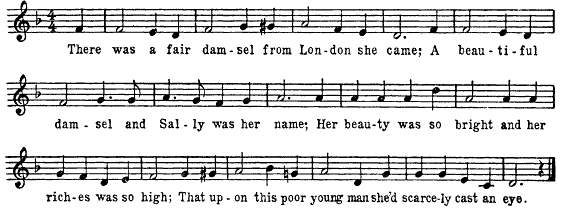
(1) There was a fair damsel, from London she came;
A beautiful damsel, and Sally was her name.
Her beauty was so bright and her riches was so high;
That upon this poor young man she'd scarcely cast an eye.
(2) "Oh, Sally, pretty Sally, oh, Sally, love," says he;
"It's I am afraid that our love it won't agree.
I'm afraid that your beauty will my ruins prove,
Unless that your hatred is turned into love."
(3) "No hatred to you, sir, nor no other man,
But to tell you that I love you is more than I can;
You may drop your intention, we'll end our discourse,
For I never will wed you, unless I am forced."
(4) "No forcing, no forcing, for you to marry me;
No forcing, pretty Sally, for you to marry me;
But the time it will come when you will relent,
And of your past actions, I hope you will repent."
(5) After fourteen weeks was over, was over and past,
This beautiful damsel felt sick at the last;
She felt sick at the last and she knew not for why,
But she sent for this young man she once did deny.
(6) "Oh, Sally, pretty Sally, oh, Sally, love," says he,
"It's am I the doctor that you have sent for me?"
"Yes, the doctor you are, that can kill or can cure;
But without your assistance, I'm ruined I am sure."
(7) "Oh, where is the pain? Does it lie in your head?
Or, where is the pain? Does it lie in your side?"
"It is neither of them, the right you've not guessed,
For the pain that torments me lies sore in my breast."
(8) "Oh, Sally, pretty Sally, oh, Sally, love," says he;
"Oh, well I remember when I first courted thee;
When I first courted you, you treated me with scorn,
And now, I'll reward you for what's past and gone."
(9) "Oh, for what has passed and gone, forget and forgive,
And grant me on this, sir, some longer to live."
"For what has passed and gone, I never will forget,
But I'll dance on your grave when you're buried in the earth."
(10) "It's farewell to my father and all of my friends;
And to you, my loving sweetheart, may the Lord make amends.
I truly would forgive him, although he won't me,
And ten thousand time over, my folly I see."
(11) Then off of her fingers, she pulled diamond rings three,
Saying, "Take them and keep them in remembrance of me;
And, when you're through dancing, call Sally your queen,
And fly from your country, no more to be seen."
(12) After Sally was dead and was buried in the earth,
The cupids from above shot an arrow of love,
Which wounded this poor young man, and caused him to complain,
And in raving distraction, he called on Sally's name.
(I3) "Oh, Sally, oh, Sally, oh Sally's dead and gone;
And for me there is no comfort, she now is in the tomb;
'Twas for me that she died, and for her I'll do the same,
For I never can live happy, oh wretch that I am."
15.2 This interesting version, called "A Rich Lady," is from the W. A. Ammons collection (see no. 9).
(1) A rich Irish lady, from London she came,
This beautiful creature, called Sally by name;
Her riches was so great that they scarcely could be told,
But her beauty and wisdom was worth all the rest.
(2) A young, wealthy squire there chanced for to be,
And this young, wealthy squire came this lady for to see;
She despisefully used him, denied him with scorn,
But, alas, he will reward her for all she has done.
(3) "My Sally, my Sally, my Sally," said he,
"It's your love and my love, it cannot agree;
Unless that your hatred be turned into love,
I am afraid that your beauty will my ruin prove."
(4) "Oh no, I don't hate you, no other man,
But to say that I loved you, it's more than I can;
So quit your intention and interdiscourse,
For I really won't marry you, unless I am forced."
(5) "No forcer, no forcer, no forcer," cried he;
"It's your love and my love, it cannot agree;
I quit my intention and enter discourse,
For I really won't marry you, if you have to be forced."
(6) About six months after, or scarce so long past,
This beautiful lady was taken sick at last;
She was tangled up in love but she did not know why;
She sent for the young man she once did deny.
(7) "Am I a doctor, you sent for me here?
Or am I that young man you once loved so dear?"
"Oh, yes, you're a doctor can kill or can cure;
Without your assistance I am ruined I am sure."
(8) "Why, Sally, why, Sally, why, Sally," said he,
"Oh, don't you remember since I last courted you?
You laughed at my courtship, my love you did scorn,
But, alas, I'll reward you for all you have done."
(9) "For what's past and gone, Love, forgit and forgive,
And grant your sweet Sally some longer to live."
"I'll never do it, Sally, and that's not the worst;
I'll dance on your grave when you're cold under earth."
(10) She pulled off of her fingers gold diamond rings three,
Saying, "Take these and wear them whilst over me;
And when you're done dancing on Sally, the queen,
Drop your colors, that flying no more to be seen."
(11) Oh, now she is dead as we all might suppose;
She has left some other lady to wear her fine clothes;
She has took up her lodging in banks of cold clay,
And her red, rosy checks are mouldering away.
16. "Rach's Spinning Song" (Sir Lionel, Child 18) [20]
16.1. Contributed by Mrs. Audrey Jarvis Hinkle of Fairmont and so titled because she learned it from her grandmother's Negro spinning woman (see Ex. 22. for tune, including chorus).
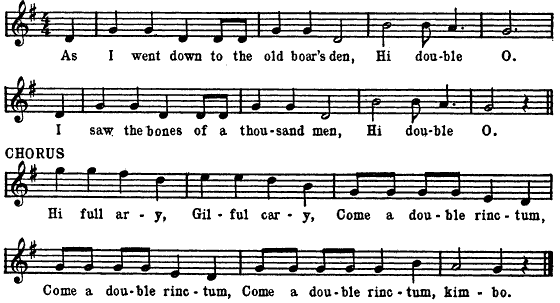
(1) As I went down to the old boar's den,
Hi double O.
I saw the bones of a thousand men,
Hi double O.
(2) The king went forth with all his men,
Hi double O.
He marched right up to the wild boar's den,
Hi double O.
(3) The queen, she wept -and wrung her hands,
Hi double O.
He came not forth from the wild boar's den,
Hi double O.
(4) Now, we all a-mournin' stand,
Hi double O.
There is no king in all the land,
Hi double O.
17. "Dandoo" (The Wife Wrapt in Wether's Skin, Child 277) [21]
I7.1. Contributed by Mrs. Henderson. The chorus is repeated after each verse (see Ex. 23 for tune, including chorus).

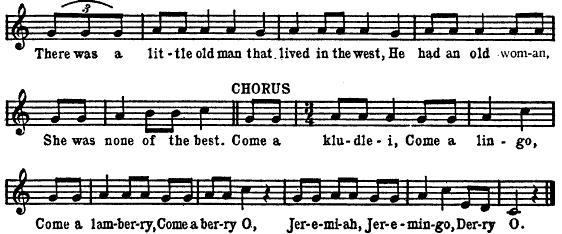
(1) There was a little old man that lived in the west,
Dandoo, dandoo.
There was a little old man that lived in the west,
He had an old woman, she was none of the best.
(2) This little old man went out to plow,
Dandoo, dandoo.
This little old man went out to plow,
Said he, "Old woman, my breakfast now."
(3) "There's a piece of cold cornbread a-layin' on the shelf,
Dandoo, dandoo.
There's a piece of cold cornbread a-layin' on the shelf,
And if you don't eat it, I'll eat it myself."
(4) This little old man, he went down to sheepfold,
Dandoo, dandoo.
This little old man, he went down to sheepfold,
He killed a wether, both fat and old.
(5) He hung him up on two small pins,
Dandoo, dandoo.
He hung him up on two small pins,
And a couple little jerks, he had him skinned.
(6) He wrapped the skin around his old wife's back,
Dandoo, dandoo.
He wrapped the skin around his old wife's back,
Took two little sticks, went whacketywhack.
(7) "I'll tell my neighbors and all my kin,
Dandoo, dandoo.
I'll tell my neighbors and all my kind
You whipped me o'er the naked skin."
(8) "I'll tell them all that you have lied,
Dandoo, dandoo.
I'll tell them all that you have lied,
For I never whupped nothin' but the old sheep's hide."
(9) This little old man, he started to run away,
Dandoo, dandoo.
This little old man, he started to run away,
Run fourteen miles in fifteen days-
And don't you call that a-gittin' away?
----------------------------------------------
18. "A Pretty Fair Maid All in a Garden." [22]
18.1. Contributed by Mrs. Ollie G. West, formerly of Vandalia, near French Creek (see Ex. 24).
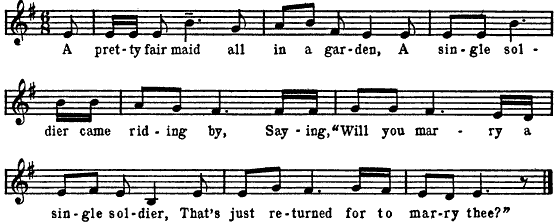
(1) A pretty fair maid all in a garden,
A single soldier came riding by,
Saying, "Will you marry a single soldier,
That's just returned for to marry thee?"
(2) "Oh, no, kind sir, a man of honor,
A man of honor you may be;
But will you impose upon a single lady,
Unworthy of your bride to be?
(3) "I have a true-love across the ocean,
And seven long years been gone to sea,
But if he stays there seven years longer,
No man on earth can marry me."
(4) "Perhaps your true-love, he is drownded,
Perhaps he's in some battle slain,
Perhaps he's to some fair girl married,
His face you never shall see again."
(5) "Oh, if he's drownded, I hope he's happy,
Or if he's in some battle slain,
Or if to some fair girl he's married,
I'll love the girl that married him."
(6) He ran his hands into his pockets,
His fingers, they were neat and small;
He showed her a ring that she had given him;
Prostrate before him she did fall.
(7) He gathered her up, all in his arms,
And gave her kisses, one, two, three,
Saying, "Will you marry a single soldier,
That's just returned for to marry thee?"
19. "Johnnie Doyle." [23]
19.1. Contributed by Mrs. Eddy; musical notation made from a recording provided by her sister, Edna Wright (see Ex. 25).
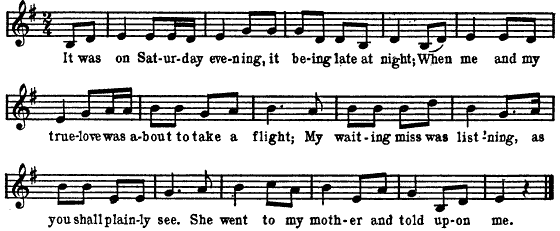
(1) It was on Saturday evening, it being late at night,
When me and my true love was about to take a flight;
My waiting miss was list'ning, as you shall plainly see.
She went to my mother and told upon me.
(2) Straightway I was led to a room of my own,
Where no one came near for to hear my sad cry;
My mother bundled up my clothes and she bade me be gone;
With a sad, broken heart, I buttoned them on.
(3) A horse and a saddle was thus prepared for me,
And a six-coupled horse back to ride by my side,
To roam this wide world over, to me would be no toil,
For my heart, it is bleeding for you, Johnnie Doyle.
(4) Behind my dear brother, I was conveyed back home,
And straightway was led to a room of my own;
I seated myself down, it was against my own bedside,
Saying, "I'm sick and in sorrow and troubled in mind."
(5) The minister, he arose and he opened the door;
Her ear rings a-burst, stood and fell to the floor;
The minister, he arose and to the groom he said,
"Be kind to my daughter for she's an innocent maid."
(6) "Oh, send for Johnnie Doyle! If it's chart he shall come.
Oh, send for Johnnie Doyle! If it's chart he shall come."
"You'll not send for Johnnie Doyle till I know it is too late,
For my heart, it is bleeding, and death is my fate."
(7) There is many a true love in courting they will find
That they never do live to enjoy each other's mind;
There's more grief on my heart than my heart can ever tell
And her last dying words was, "Sweet Johnnie Doyle, farewell."
-------------------------------------------------------
20. "One Morning in May." [24]
20.1. Contributed by Mrs. Glasscock, who learned it from her grandmother (see Ex. 26).


(1) One morning, one morning, one morning, in May,
I spied a fair couple a-making their way,
A-making their way to a place in Orleans
For to see the waters gliding, hear the nightingales sing.
(2) Out from under his jacket, a fiddle he drew;
He played it so sweetly, caused the valleys to ring.
. . . . . . . . . . . . . . .
"Hark, hark!" said the lady, "hear the nightingales sing."
(3) "Oh now," said the lady, "won't you marry me?"
"Oh, no," said the soldier, "that never could be.
"I've a wife in old London and children twice three,
And two in the army-that's a-plenty for me!"
21. "Pretty Polly" ("Polly Oliver") [25]
21.1. Contributed by Mrs. Glasscock (see Ex. 27). Since tunes and texts are almost identical, the contribution of "Polly Oliver" by Mrs. Eddy and Mrs. Wright is ommitted here.
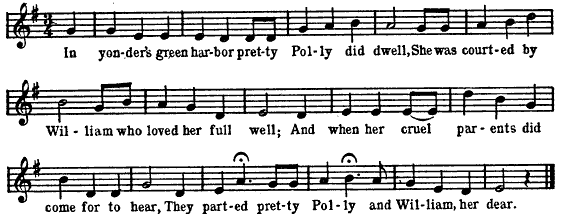
(I) In yonder's green harbor pretty Polly did dwell,
She was courted by William, who loved her full well;
And when her cruel parents did come for to hear,
They parted pretty Polly and William, her dear.
(2) As Polly was lying on her own downy bed,
Some projects or notions came into her head:
Neither father nor mother can make me false prove,
I'll dress like a soldier and I'll follow my love.
(3) Very early next morning when Polly arose,
She dressed herself up in a suit of men's clothes;
Her long, yellow hair all like gold it did shine,
In every description, she looked like a man.
(4) She went to the stable and she viewed the stalls round,
And there found a horse that could travel the ground.
With a brace of bright pistols and a sword by her side,
Pretty Polly, little Polly, like a trooper did ride.
(5) She rode and she rode till she came to the hall,
And there she put up by the leave of them all;
The first one that entered was a brave English lord,
The next one that entered was Polly's true love.
(6) "Here's a letter, a letter, from Polly, your dear,
I hope you will take it and read it it with care;
And under the seal there's a guinea to be found,
I hope you and your soldiers will drink a health round."
(7) He took it and he read it, and he read it full slow,
While tears from his eyes like a fountain did flow;
And when he had ended, put his hands by his side, saying,
"Where'er I meet Polly, I'll make her my bride."
(8) Now Polly, being weary, she hung down her head;
She called for a candle to light her to bed.
"I've a bed of my own, Sir, I can lie at my ease;
And you may lie with me, kind Sir, if you please."
(9) "To lie with a soldier is a dangerous thing;
Although I'm a soldier, I'll fight for my king.
"I'm a soldier on sea, I'm a soldier on shore;
Pretty Polly, little Polly, is the girl I adore."
(10) Very early next morning, when Polly arose,
She dressed herself up in a suit of her own clothes,
Came tripping downstairs, saying, "How gallant I'll prove.
Now, William, here's Polly; now, make her your bride."
(11) Now, Polly, being married, she lives at her ease;
She goes where she wants and she comes when she please;
She left her old parents in silence to mourn,
"You're welcome, young William, we're a long ways from home."
--------------------------------------------------
22. "Soldier, Soldier." [26]
22.1. As sung by Mrs. Wright (see Ex. 28)
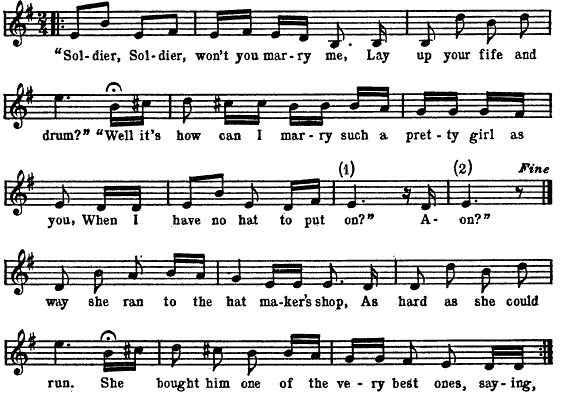
(1) "Soldier, Soldier, won't you marry me,
Lay up your fife and drum?"
"Well, it's how can I marry such a pretty girl as you,
When I have no hat to put on?"
Away she ran to the hat-maker's shop,
As hard as she could run.
She bought him one of the very best ones, saying,
(2) "Soldier, Soldier, won't you marry me,
Lay up your fife and drum?"
"Well, it's how can I marry such a pretty girl as you,
When I have no shirt to put on?"
Away she ran to the shirt-maker's shop,
As hard as she could run.
She bought him one of the very best ones, saying,
(3) "Soldier, Soldier, won't you marry me,
Lay up your fife and drum?"
"Well, it's how can I marry such a pretty girl as you,
When I have no shoes to put on?"
Away she ran to the shoemaker's shop,
As hard as she could run.
She bought him some of the very best ones, saying
(4) "Soldier, Soldier, won't you marry me,
Lay up your fife and drum?"
"Well, it's how can I marry such a pretty girl as you,
When I have a wife and three kids at home."
[Mrs. Wright did not sing the last line, explaining that she was unable to fit the words to the tune properly.]
----------------------------------------
23. "The Merchant" ("Eggs and Marrowbones") [27]
23.I. Contributed by Mr. Rittenhouse. (See Ex. 29 for tune and chorus, which is repeated after each verse.)


(1) There was an old woman;
In London she did dwell;
She loved her old man dearly,
But another twice as well.
(2) She went up to the doctor
To see if she could find
Anything at all
That would make her old man blind.
(3) She got six dozen marry bones
And made him suck them all.
"And, now," said the old man,
"I cannot see at all."
(4) "Here I am all sick and blind
And only in your way;
Oh, I would drown myself,
If I could find the way."
(5) She took him by the hand
And she led him down the stream.
"Now," said the old man,
"you'll have to push me in."
(6) She stepped back a pace or two
And gave a sudden spring;
The old man side-stepped,
And she went headlong in.
(7) Being tender-hearted,
And afraid that she would swim,
He took a longer pole
And he pushed her farther in.
(8) "Here's a dozen children,
And none of them I own.
I wish that every farmer
Would come and claim his own."
-----------------------------------------
24. "Death Is A Melancholy Call." [28]
24.I. Contributed by Mrs. Glasscock, who learned it from her grandmother. See 24.2 for tune and extended text, since they are much alike.
(1) Death is a melancholy call,
A certain warning sent to all;
It takes the young as well as old,
It takes them in its arms so cold;
It is awful, awful, awful.
(2) I saw a youth the other day,
All in his prime did look so gay;
He'd wasted all his time away,
And dropped into eternity,
And it's awful, awful, awful.
24.2. This version, called "It's Awful, Awful, Awful," was contributed by Mrs. Henderson, who first sang stanza 1 as stanza 2, a few days later sang them in the order given below. (See Ex. 30.)
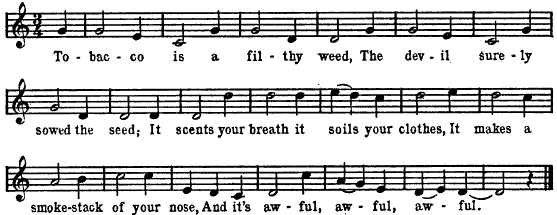
(1) Tobacco is a filthy weed,
The devil surely sowed the seed;
It scents your breath, it soils your clothes,
It makes a smoke-stack of your nose,
And it's awful, awful, awful.
(2) There's so many people in their mirth
Attract the habit from their birth;
They chew, they smoke a filthy weed,
And doth commit a sinful deed,
And it's awful, awful, awful.
(3) At every shore there's quite enough
Without the ladies a-using snuff;
They care not what the people say,
They take a box and rub away,
And it's awful, awful, awful.
(4) And when they're in the house of prayer,
The old snuff box, it's always there;
And when upon their knees they're found,
It's then they pass the snuff box round,
And it's awful, awful, awful.
(5) There's little girls that can scarcely walk,
Or use their prattling tongues to talk
Before they lay aside their toys,
They rub the snuff and court the boys,
And it's awful, awful, awful.
(6) I'll tell you now, young man, be wise,
And save your head, your heart, and eyes,
And if you chose (choose) a happy life,
Don't take a snuff, boy, for a wife,
Fer it's awful, awful, awful.
(7) Fer when she talks or laughs or fights,
She'd keep her face in an awful plight;
And if you kiss the lips so rough,
You're sure to git a peck of snuff,
And it's awful, awful, awful.
(8) Their ma's work hard; they spin, they cook,
And, oh how healthy they do look!
The girls sits round and chews their snuff,
And oh, how old, how blue, how tough!
And it's awful, awful, awful.
--------------------------------
25. "Willie Brooks." [29]
25.I. Contributed by Mrs. Glasscock, who learned it from her grandmother (see Ex. 3I).
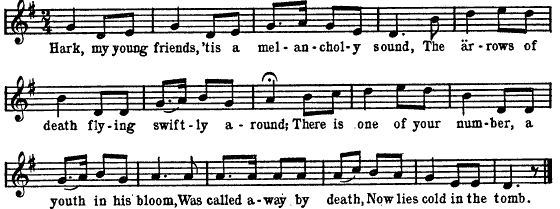
(1) Hark, my young friends, 'tis a melancholy sound,
The arrows of death flying swiftly around;
There is one of your number, a youth in his bloom,
Was called away by death, now lies cold in the tomb.
(2) Although he is dead, he's inviting you to come;
Go read his inscription, go read it on the tomb.
Go down to yonder's graveyard, go read it there with care;
Remember, it won't be long till your body will be there.
(3) My parents, they thought they had taught me full well,
They thought they had taught me to shun the gates of hell.
I slighted them all, my own way I took;
Remember this young man, whose name is Willie Brooks.
(4) Come all my young friends, and a warning take from me;
Never place your affections on sin and vanity.
Remember this young man, whose name is Willie Brooks.
------------------------------------------
26. "Elk River Boys." [30]
26.1. Contributed by Mrs. Henderson, (see Ex. 32).

(1) Come all you brave Elk River boys,
Some shocking news to tell;
We've lost one of our Elk River boys,
The one we loved so well.
(2) He started out upon the tide,
As he often did before.
Little did he think 'twas his last long ride-
He never would start no more.
(3) There was a man stayed with his wife,
Each night while he was gone;
They laid a plot to murder him
As soon as he came home.
(4) Poor Jay came home one cold winter's night,
Both cold and hungry too,
He didn't have time to sit down and warm
Till a bullet had pierced him through.
(5) His gun was loaded and laid away,
As the murderers, they did plot;
And with his own Winchester gun
He received the fatal shot.
(6) There was two men a-passing by,
They stepped up to the door;
And there they spied poor Jay's body
A-bleeding on the floor.
(7) His little child held up his head,
While his life's blood ebbed away;
And to his mother he did say,
"What made you kill poor Jay?"
(8) "It was an accident," she said,
But she did not seem to care.
She thought her own state's evidence
Would bring her out so clear.
(9) He fixed his eyes on his little child,
But nothing could he tell.
He fixed his dying eyes on them
To bid 'em his last farewell.
(10) Now Jay is dead and laid away,
His troubles, they're all done;
His wife is in the Clay County jail,
Her troubles are just begun.
-------------------------------------------
NOTES [Part 2] Songs 8-26
11. [This is the final section of a two-part paper. Songs 1.-7. were printed in JAF, LXX (1957), 247-261. Musical examples have been grouped following the texts and numbered consecutively throughout the two sections, as have also the author's notes. Ed.]
12. Also in Percy's Reliques as well as Belden, pp. 57-60; Chappell, pp. 29-31; Cox, pp. 94-95; Leach, pp. 265-273; Mackenzie, pp. 27-34; Randolph, I, 124-126; Scarborough, pp. 143-149; Sharp, I, pp. 161-182; Wells, pp. 110-113.
13. Perhaps the most widely known of all ballads, this is in almost every collection; see especially Percy's Reliques; Belden, pp. 60-65; Brewster, pp. 99-121; Chappell, p. 32; Cox, pp. 96-109; Leach, pp. 277-280; Mackenzie, pp. 35-40; McGill, pp. 39-40; Morris, pp. 283-290; Randolph, I, 126-139; Scarborough, pp. 93-97; Sharp, I, I83-I95; Wells, pp. 113-114.
14. See Brewster, pp. 122-124; Leach, pp. 288-295; Randolph, I, 141-142; Sharp, I, 201-206.
15. In Belden, pp. 73-76; Brewster, p. 134; Chappell, p. 37; Cox, pp. 130-133; Leach, pp. 539- 544; McGill, pp. 14-17; Morris, pp. 304-307; Randolph, I, 152-160; Scarborough, pp. 215-225; Sharp, I, pp. 233-239; Wells, pp. 116-117.
16. Belden, pp. 76-78; Chappell, p. 37 ("Johnny Wedlock" tune); Cox, pp. 135-136; Leach, pp. 554-559; Musick, "The Old Album of William A. Larkin," JAF, LVI (I947), 245-246 (also unpublished Iowa and Missouri versions, "Georgie" and "George E. Wedlock," respectively-Randolph published the text of the latter (I, 162-164) but not the tune; Wells, pp. 118-119.
17. See Belden, pp. 79-87; Brewster, pp. 136-148; Chappell, pp. 38-40; Leach, pp. 598-606; Morris, pp. 311-3I5; Musick, unpub. Mo. coll., also an Iowa version, "The Ship Carpenter"; Randolph, I, 166-173; Scarborough, pp. 150-159; Sharp, I, 248-258.
18. Belden, pp. 101-102; Cox, pp. 172-173; Leach, pp. 673-674; Mackenzie, p. 165; McGill, pp. 45-49; Morris, pp. 328-329; Musick (1947), pp. 237-238, "The Saillers" (in 6 stanzas, second of which seems to be chorus); Randolph, I, pp. 202-204; Scarborough, pp. 189-190.
19. Brewster, pp. 164-165; Leach, pp. 678-680; Morris, pp. 330-33I; Musick, unpub. Mo. coll., "Pretty Sally of London", Randolph, I, 204-213; Scarborough, pp. 97-98; Sharp, I, 295-304.
20 Belden, p. 293; Leach, pp. Ioo-Io3; McGill, pp. 78-81; Randolph, I, p. 72; Scarborough, p. 407; Sharp, I, pp. 54-55.
21. Belden, pp. 92-94; Brewster, p. 151; Cox, pp. I59-I63; Leach, pp. 658-660; Morris, p. 322; Randolph, I, pp. 187-188; Sharp, I, pp. 271-274; Wells, p. 121.
22. Belden, pp. 149-150; Chappell, p. 122; Cox, pp. 3I6-3I8; Mackenzie, pp. 168-171; Musick- 2 other texts and tunes in unpub. W. Va. coll.; Randolph, I, 258-261; Scarborough, pp. 260-264; Sharp, II, pp. 70-73.
23. The word "chart" in stanza 6 evidently means something like "possible"; stanza 5, line 2, was no doubt originally sung as "Her earrings a-bursted, and fell" rather than "a-burst, stood." See Mackenzie, p. 206; Morriss, pp. 331-333; Randolph, I, pp. 350-353; Scarborough, pp. 249, 42I; Sharp, II, p. 27.
24. Belden, pp. 239-243; Leach, pp. 744-745; Morris, pp. 360-361; Scarborough, pp. 310-311; Sharp, II, pp. 192-194; Wells, p. 222.
25. Belden, pp. I83-I95; Cox, pp. 387-388; Musick-one other unpub. W. Va. version, "Pretty Molly," contributed by Mrs. Eddy. Both text and tune are very similar to the one here included; in the Sharp version (b) the girl is called Molly.
26. Brewster, p. 357; Cox, p. 467; Musick-two other unpub. W. Va. tunes and 3 texts; I text and tune in unpub. Mo. coll.; Randolph, I, pp. 289-290; Sharp, II, pp. 40-41.
27. Belden, p. 238; Brewster, p. 281; Cox, p. 464; Musick, 3 other unpub. W. Va. texts and 2 tunes (less interesting), also 2 texts and tunes in unpub. Mo. coll.; Sharp, II, pp. 348-349.
28. have found no other parody than that given in 24.2 in ten texts recently examined; perhaps this is known only in W. Va. No tune is given for 24.1 since it is so similar to 24.2, and little of the text appears because it is easily found in other collections. See, e.g., Belden and Randolph.
29. Included in Randolph, IV, pp. 40-41, but in no other collection that I examined.
30. This is apparently a West Virginia murder, though Cox does not mention it. I did not search for out-of-state versions.
Fairmont State College
Fairmont, West Virginia